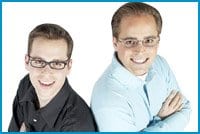Programs matching science and technology students with mentors in their field of study are a dime a dozen. Unfortunately, many mentoring programs forbid discussion of personal life and, even if protégés could be open about being queer, a straight mentor may not be able to offer constructive advice on dealing with work-related problems unique to queers.
Now the National Organization Of Gay And Lesbian Scientists And Technical Professionals (NOGLSTP), a US-based organization with members all over the world, has launched a program that’ll give young geeks a chance to get an experienced opinion on all their queer-related quandaries.
“One unique aspect to a career in the sciences is that the work is often carried out in a rather isolated environment,” says NOGLSTP mentoring program coordinator Amy Ross. “We have found that the social interaction and the ‘Gee, there are other queer scientists like me’ factor that NOGLSTP provides is helpful to people who work in highly demanding technical fields.”
NOGLSTP is now actively soliciting queer professionals and academics who wish to volunteer as mentors, as well as students, postdoctorates and early-career faculty who would like to have a mentor. Although there is no guarantee of being matched with other queer members, the more people sign up the better the chances.
IBM, a corporate leader in recognizing sexual diversity in the workforce — the company has 46 queer- and trans-specific employee resource groups worldwide — has kick-started the funding for NOGLSTP’s mentoring initiatives with a $10,000US donation. (Although their Toronto location is expected to participate in the program, representatives of the multinational corporation were not yet prepared to comment on their involvement at press time.)
To give fledgling queer scientists a better chance of hooking up with a ‘mo mentor, NOGLSTP has formed a partnership with another US organization called MentorNet. Billed as “the e-mentoring network for diversity in engineering and science,” MentorNet matches female and minority students, postdoctoral fellows and early career faculty with experienced mentors in academia and industry.
Although the University Of Waterloo is currently the only Canadian university partnered with MentorNet, past partners have included the University Of Toronto, University Of Sask-atchewan and University Of Manitoba. Through the new partnership, NOGLSTP student members will be able to participate in Mentor-Net regardless of whether or not their university is a MentorNet partner; a student NOGLSTP membership costs $10US.
Within MentorNet’s program, protégés can indicate interest in discussing issues related to sexual orientation, while mentors can indicate comfort discussing these issues. That information is then used to match protégés with an appropriate mentor.
Although NOGLSTP’s partnership with MentorNet only includes North America at the moment, there are hopes to expand internationally.
“There is a lot to consider given global differences in educational systems, acceptance of GLBT [gay, lesbian, bisexual, trans] people in the workplace, and, of course, job search issues,” says Ross.
NOGLSTP’s efforts are not limited to the partnership with MentorNet. By August the organization hopes to be distributing a series of educational brochures on the benefits of queer mentoring programs targeting queer groups at colleges and universities, as well as science and technological companies. Three display booths will tour conferences, meetings and Pride events to get the word out to academic, corporate and professional audiences. Plans are also in the works for a comprehensive database of queer- and trans-supportive programs in both the academic and corporate worlds.

 Why you can trust Xtra
Why you can trust Xtra


